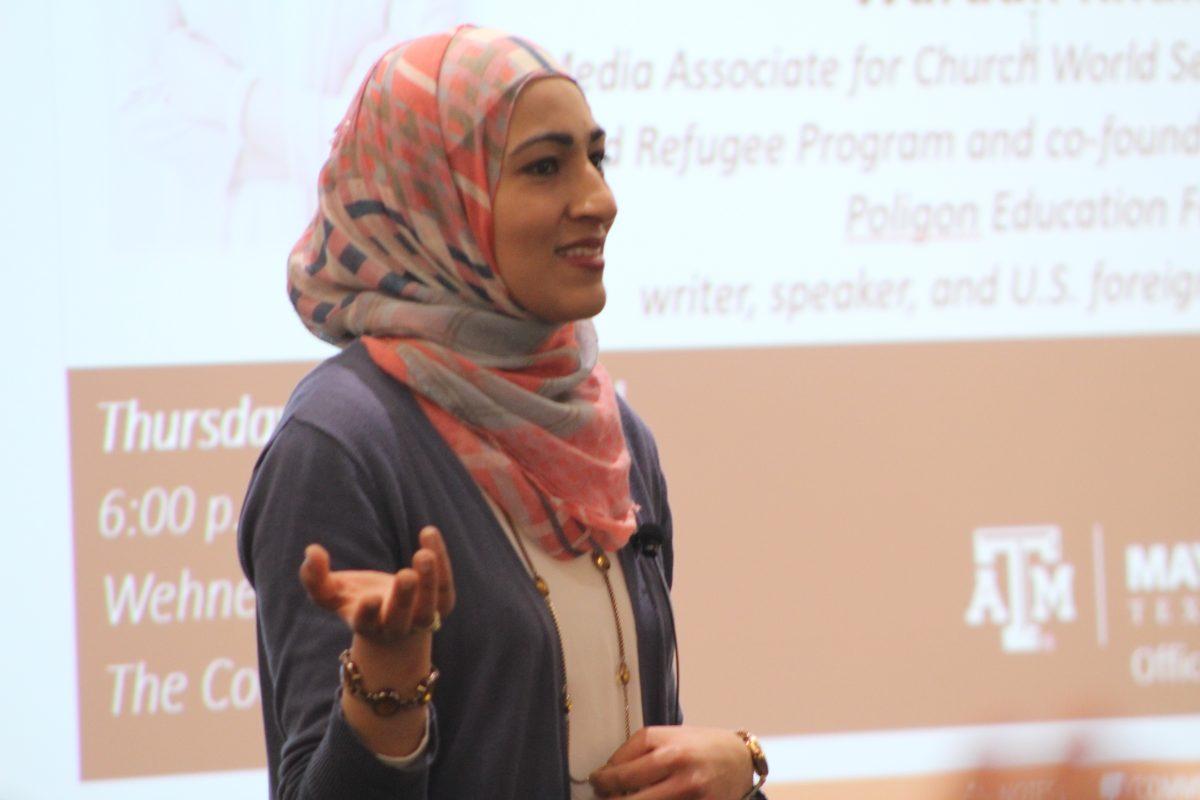Former A&M student and Middle Eastern policy and Muslim American issues analyst Wardah Khalid spoke in Wehner Hall on Thursday as part of the Mays Speaks initiative, a diversity-focussed lecture series at the Mays business school.
Associate professor and assistant dean for Diversity and Inclusion Annie McGowan said she knew Khalid would be perfect for the lecture series.
“As one of my former students, I knew her passion,” McGowan said. “After she graduated, we remained connected. She’s an expert on these issues. She’s spoken before Congress. She’s a master in this field.”
McGowan added that it is an honor to have a former student of such prominence come back to College Station.
“Having one of our own come back to deliver the message, it carries a little bit of power,” McGowan said.
Business honors sophomore and Mays Speaks consultant Azra Razvi said that goal for the lecture was very clear from the planning stages.
“We hoped they took away acceptance, and then love, from a community that doesn’t receive that,” Razvi said. “We need to show that the terrorism in the media, that is not Islam.”
Khalid, class of 2008, is the president and co-founder of the Poligon Education Fund, a nonprofit group that works to increase American Muslim participation and representation in the U.S. government. Her speech on Thursday dealt with handling with the anti-Muslim bias in the workplace.
Khalid spoke for over an hour, using lecture slides to illustrate points and statistics about Islam, then gave the audience an “Islam 101” crash course to clear up any misconceptions about Islam and the Muslim faith.
“Most people don’t have an irrational fear [of Islam], but they go along with it,” Khalid said during her lecture. “This islamophobia industry has fed [Islamophobia] to politicians, so it has an effect on policy.”
Khalid continued by saying she believes Islamophobia is caused by public ignorance to what Islam is.
“Two-thirds of Americans have not met a Muslim,” Khalid said. “There is no stereotypical Muslim. Most are not Middle-Eastern. There’s a lot of education to be done there.”
Khalid said one issue with public perception of Islam is that people tend to make assumptions about it.
“You can’t know a religion by just looking at one line or a soundbite. You need to get deeper into the issue,” Khalid said. “You can’t know everything about a person if you have assumptions. Have an open mind and try to learn about them.”
During her lecture, Khalid asked the crowd to list common misconceptions they believe people have about Islam, so that she could clear them up. The first one asked about whether or not Islam promotes violence and terrorism.
“Islam literally means ‘peace’. It does not promote violence,” Khalid said. “There’s a lot of other factors that go into terrorism, and most importantly, it’s usually politics. People are not joining these terrorists groups, or doing these acts, because Islam is telling them to. They’re doing it for political reasons.”
Khalid gave several pieces of advice for relating to and respecting Muslims in the workplace. Examples include planning non-alcoholic events, giving Muslims proper time and preparation to pray, and incorporating the hijab into a uniform.
After her speech, Khalid took questions from the crowd. One of the first and most discussed questions was about how to deal with intolerance.
“Stay out of the echo-chamber,” Khalid said. “Be there for your Muslim friends. Build off of those personal connections. Amplify positive Muslim stories in the media instead of always talking about terrorism, so working with the journalism and media industry to change the narrative to something more representative of what Muslims are is a large part of that.”
Another question was about why Khalid chose to work in foreign policy.
“I used to write for the Battalion, and that made me more in tune with campus. I wanted to continue writing, and I began hearing the headscarf. And I found I wanted to write about my faith,” Khalid said. “I called the Houston Chronicle and wrote there every single week about my experiences. It just kinda went from there. I had a desire to work on policy and change in DC, and I did a lot of civic engagement work on the side. I decided to go get my masters in international affairs and work on foreign policy, and just went from there.”
The lecture was attended by students, faculty and citizens of the Bryan-College Station area. They attended for different reasons, ranging from curiosity to class credit.
“I just wanted to hear about the faith from someone who lives it,” supply chain senior Taylor Turcott. said. “It’s always good to learn, and this was a chance to learn.”
Marketing senior Bailey Wood said her biggest takeaway was learning how to combat misconceptions.
“Learning how to deal with people’s assumptions and bias was really good,” Wood said. “And it was really interesting to hear about how the 9/11 attacks did not amplify Muslim bias as much as I thought.”
“Mays Speaks” is a continuing dialogue series with topics designed to inform students about diversity.
“We want to create transformative leaders. We want to create a climate where diversity is welcome,” McGowan said.
More information, including dates and topics about “Mays Speaks” can be found on the Mays Business School website.
Former student addresses anti-Muslim bias in the workplace
February 24, 2017
Photo by Photo by Madeline Sambrano
Former student Wardah Khalid spoke about Muslim awareness and diversity in the workplace as part of the “Mays Speaks” initiative.
0
Donate to The Battalion
$1815
$5000
Contributed
Our Goal
Your donation will support the student journalists of Texas A&M University - College Station. Your contribution will allow us to purchase equipment and cover our annual website hosting costs, in addition to paying freelance staffers for their work, travel costs for coverage and more!
More to Discover










